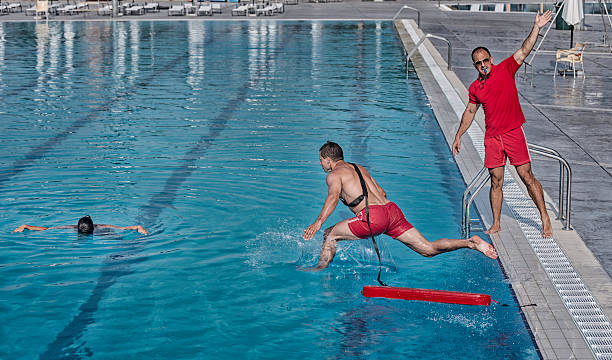When it comes to ensuring the safety and well-being of individuals in aquatic environments, lifeguards play a vital role. They are responsible for preventing accidents, responding swiftly in emergency situations, and offering crucial support to those in need.
While organizations like the American Lifeguard Association provide lifeguard training in California and offer lifeguard classes near me, it’s important to understand the qualities that make a lifeguard truly exceptional.
In this article, we will explore the key attributes that make a lifeguard stand out in their profession, ensuring the safety and enjoyment of swimmers.
Strong Swimming Skills
One of the most fundamental qualities of a lifeguard is their ability to swim proficiently. Lifeguards must possess excellent swimming skills to navigate through the water swiftly and effectively. These skills allow them to reach distressed swimmers quickly and rescue them in a timely manner.
A strong swimming foundation is built during lifeguard training in USA, where individuals learn different strokes, water rescue techniques, and endurance exercises to enhance their overall aquatic abilities.
Physical Fitness and Stamina
Lifeguarding is a physically demanding job that requires individuals to be in excellent shape. They need to maintain their fitness levels to respond swiftly during emergencies and perform rescue techniques with ease. Lifeguards must undergo rigorous training that includes physical conditioning, endurance exercises, and strength training.
By staying physically fit, lifeguards can effectively fulfill their responsibilities and maintain the highest level of safety at all times.
Effective Communication Skills
Clear and concise communication is paramount for lifeguards in their interaction with both colleagues and the public. Lifeguards must be able to relay instructions and warnings to swimmers effectively, ensuring their compliance with safety guidelines.
Additionally, they should possess strong interpersonal skills to interact with a diverse range of individuals in a calm and professional manner. Effective communication skills are emphasized during lifeguard classes, as they are crucial for maintaining order and ensuring a safe swimming environment.
Quick Decision-Making Abilities
In emergency situations, lifeguards must make split-second decisions that can save lives. They need to assess the situation swiftly, evaluate risks, and determine the appropriate course of action. These decision-making abilities are honed through lifeguard training, where lifeguards are exposed to realistic scenarios and taught how to respond effectively.
The ability to remain calm under pressure and make decisive judgments is a quality that sets exceptional lifeguards apart.
Vigilance and Attention to Detail
Lifeguards must remain vigilant at all times, constantly scanning the pool or beach area for potential hazards. They need to be proactive in identifying and addressing unsafe conditions or behaviors before accidents occur. Attention to detail is crucial for noticing subtle signs of distress in swimmers and recognizing potential dangers in the surrounding environment.
Lifeguard certification programs emphasize the importance of vigilance, training lifeguards to be alert and attentive throughout their shifts.
Strong Problem-Solving Skills
In addition to their primary responsibility of preventing accidents, lifeguards often encounter unexpected challenges that require quick thinking and problem-solving abilities. Whether it’s dealing with a minor injury, resolving conflicts between swimmers, or addressing equipment malfunctions, lifeguards must be resourceful and adaptable.
They should be able to respond effectively to any situation that may arise, maintaining the safety and well-being of everyone under their supervision.
Professionalism and Teamwork
Lifeguards work in a team environment where effective collaboration is essential. They must be able to work cohesively with their colleagues, supporting each other and sharing responsibilities. Lifeguards should demonstrate professionalism in their behavior and appearance, as they serve as role models for swimmers and the public.
Professionalism is instilled during lifeguard classes, where individuals are trained to uphold high standards and adhere to the code of ethics set by their profession.
Leadership and Authority
As the guardians of water safety, lifeguards must demonstrate leadership and authority in their role. They are responsible for enforcing rules and regulations, ensuring swimmers adhere to safety guidelines, and taking control of chaotic situations.
Lifeguards should possess a commanding presence that instills confidence in swimmers and reassures them that their safety is the top priority. Through their leadership skills, lifeguards can maintain order, prevent accidents, and effectively manage any emergencies that may arise.
Continuous Learning and Adaptability
The field of water safety is constantly evolving, and exceptional lifeguards recognize the importance of continuous learning and adaptation. Lifeguard certification provides a solid foundation, but lifeguards should actively seek opportunities to enhance their skills and knowledge.
They should stay updated on the latest rescue techniques, first aid protocols, and safety advancements. Lifeguards who are committed to lifelong learning are better equipped to handle new challenges and provide the highest level of care to swimmers in their charge.
Compassion and Empathy
While lifeguards must be vigilant and enforce rules, they should also demonstrate compassion and empathy towards those they serve. Swimmers may experience distress, panic, or injuries, and lifeguards need to provide reassurance and support.
Exceptional lifeguards understand the importance of empathy and how it can positively impact someone in a vulnerable situation. They offer a comforting presence, provide clear communication, and show genuine concern for the well-being of those they rescue or assist.
Summary
Exceptional lifeguards possess a range of qualities that make them stand out in their profession. From strong swimming skills and physical fitness to effective communication and quick decision-making abilities, lifeguards must excel in various areas.
They demonstrate leadership, continuously adapt and learn, and approach their responsibilities with compassion and empathy. Lifeguard training plays a crucial role in developing these qualities, and organizations like the American Lifeguard Association contribute to the overall standard of lifeguarding excellence.
By embodying these qualities, lifeguards ensure the safety and well-being of individuals in aquatic environments, making them indispensable guardians of water safety.


